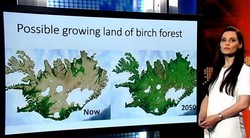The weather in Iceland in 2050
United Nations' Climate Week
Next week, the United Nations' Climate Week NYC will be held in New York. It is the collaborative space for all related events in support of the upcoming UN Climate Summit, convened by Secretary-General Ban Ki-moon on Tuesday September 23.
Iceland's representative on Climate Week NYC will be Birta Líf Kristinsdóttir, Icelandic Met Office, one of eleven TV meteorologists who were asked to make a weather forecast for their own country in 2050 based on the visions of the newest IPCC report. These weather forecasts of the future are presented as a set of videos, made in collaboration with WMO and published one per day until the summit.
The Icelandic video consist of a weather forecast with English subtitles and an account in English of the major effects of global warming in the country. Every video is concluded by UN Secretary-General's call for action on climate change.
A forecast for Iceland in 2050
Iceland will be warmer and may experience more rain than it does currently. With warmer weather, areas where forest may grow will be larger. However, warmer temperatures also bring new insects that cannot thrive in Iceland today and some of these may also be harmful to native plants.
The establishment of new species will put a strain on the ecosystem both flora and fauna. This is already apparent with regards to marine life where warmer ocean temperatures result in the northward movement of the ranges of some fish stocks. The acidification of the ocean may also adversely impact ocean food webs, with possible consequences on fisheries.
Iceland's ice caps have been melting and will continue to do so. According to scientific estimate, they will almost disappear in the next 200 years.
Many of these changes can already be seen, for instance: The tiny ice cap Ok, west of Langjökull, has changed beyond recognition and is not registered as a glacier anymore; every year new species are reported in the ocean and the average temperature in Iceland for the last 10 years has been well above the average temperature of the 20th century in Iceland.





